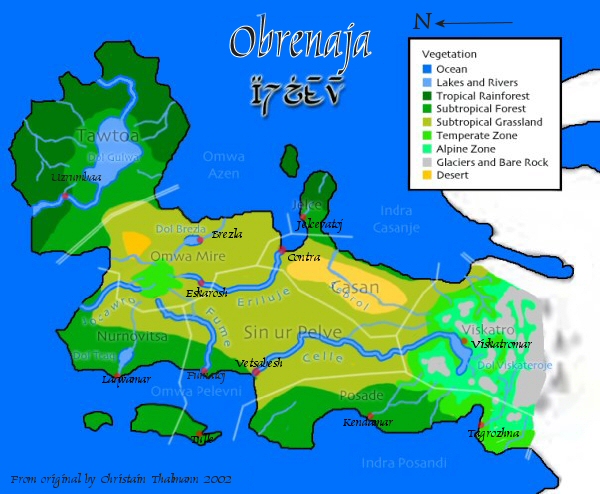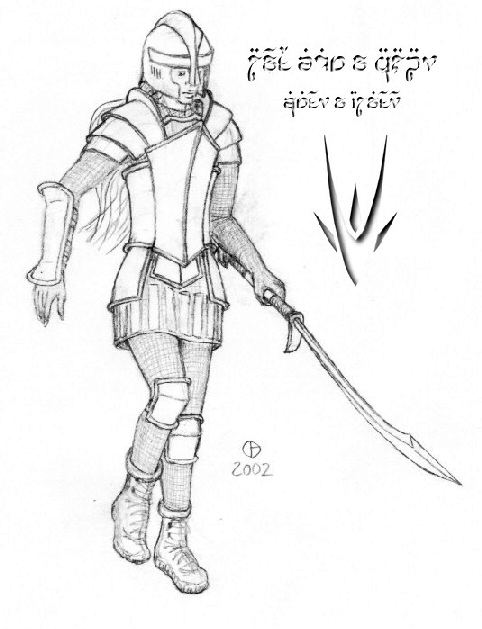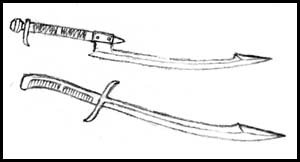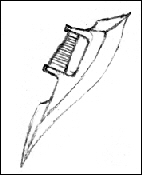Obrenaja
Land of the Antelope
The nation of Obrenaja occupies a great tongue of land that extends from the northern side of Perfection of Concordance. It lies on the far side of the Great Glacier from the Empire of Splendour, bordered by the Queendom of Mopendor to the east, and the mysterious land of Sharroc to the west. The people of Obrenaja, the Obrenaj, have forged a stable, peaceful and advanced society in the face of ancient wars with the Ssth-gar, and now find themselves an important centre in the growing trade between the Merchants League and the Outer Continent.
The obrenaj people are free-spirited, with a love of open spaces, of wind and sun, of music and song, and of socialising and philosophising. They are of humankind, although obrenaj are notably better at running than most other humans. Obrenaja seems to lie in an area of high Concordance, even for the Continent of Perfection, and so the obrenaj tend towards the study of what they term natural harmonics, a more scientific discipline, over magic. The results, however, are similar to what other cultures might deem to be magical.

The Society
The obrenaj often refer to the nation of Obrenaja simply as The Society. Government is organised in a tiered system of nation, province, county, town and locom. Each level is governed by a council of representatives elected from the tier below, and each level is granted as much autonomy as feasable by the higher levels. Resources are distributed where needed, with donations being a good way of gaining social status. Although this ensures a basic level of wealth for most citizens, the system is not perfect and not all areas of Obrenaja are equally funded.
The Provinces
The two largest and most populous provinces are Sin ur Pelve ("Land of Wind") and Omwa Mire ("Sea of Gold"), covered in wide, open, subtropical grasslands. A number of small cities line the courses and deltas of the larger rivers. Sin ur Pelve also harbors the capital city of Obrenaja, named Vetsabesh. The grassland people display the vibrant savoir-vivre that has become proverbial for the obrenaj.
The provinces of Posade and Nurnovitsa receive more precipitation due to their proximity to the western coast. Their soil is fertile, and their well-developed agriculture accounts for the lion's share of Obrenaja's produce surplus. The pleasant sea-side city of Tagrozhna is a center of natural harmonics and culture featuring a renowned medical academy.
The province of Casan is the most arid part of Obrenaja, the greater part of its area being claimed by a desert. Most of its population is concentrated in its sole large city, Contra. Despite some flourishing metal industry in the outskirts of Contra, the province is rather poor and has to rely on grain imports from Posade and Nurnovitsa in particularly dry years. However, Contra is growing in importance relative to Vetsabesh due to increased trade with the Merchants League. The Casanje people are said to be taciturn and stoic in most situations, except when dancing orra, a passionate tango-like pair dance.
The province of Viskatro is situated on the mountain range at the base of the peninsula, thus its climate is mostly alpine. Its inhabitants are said to be somewhat conservative and uppish, but also connoisseurs of the fine arts. Viskateroje rose wine is a luxury highly appreciated in many cultures of the world, including the Empire of Splendour. The tiny province of Jelce is a protrusion from the far end of the peninsula, and features some tropical rainforest.
The Locom
The locom is the obrenje equivalent of an extended family, usually comprising 50-100 individuals. Child-rearing is communal, with the result that obrenaj tend to have fairly weak ties to their biological parents. Although members of a locom may have private dwellings, locoms tend to have communal meals, morning gymnastics, evening singing and communal bathing. Inter-locom meetings are encouraged and larger gatherings of people are common for parties, markets, concerts and sporting events. Citizens may switch locoms many times in their lives, for example, a man might grow up in a rural locom, then move to the city to study, get married and join the locom of his wife, and finally be offered an important position in the city, whereafter he might move to an urban locom with his wife (and children, though if they're young the children will prefer to stay with their caretakers and peers).
There's no rule as to which partner of a married couple joins whose locom, and they may well join an entirely different one. Obrenaj keep the name of their birth locom, though. An obrenaj's full name is (first name) (mother's name) ur (locom), e.g. Sinel Caron ur Makazhow would be Sinel, the daughter of Caron, born in the locom of Makazhow.
Religon, Magic and Natural Harmonics
The obrenaj are not a religiously dogmatic people. They have an old tradition concerning an ever-young goddess of life named Mali, but the old texts are treated as little more than colourful metaphors, used as the basis for entertainments. However, the obrenaj are fairly spiritual, feeling an affinity for the "spirit of the land" in the form of wind, sun and open spaces. The revere the antelope as a totemic animal, although this does not extend to actual worship. There are no organised religions in Obrenaja; the people tend towards a humanist ethic. Contact with the Merchants League has bought Imperial religion and philosophies, and the teachings of Manrupashnar have found a receptive audience amongst the obrenaj.
Free magic is weak in Obrenaja, and the obrenaj practice natural harmonics, a rigorous system similar to the Imperial Path of Water and Mountains, relying on specific, precise arrangments of sound, colour, shape, movement, scent and other aspects in order to tap into the harmonics of strongly Concordant magic. The obrenaj do not view this as "magic", a term they use for the use of natural harmonics by superstitious people who do not fully understand what they are doing.
With their preference for safety and comfort, the obrenaj have made the greatest progress with natural harmonics in the fields of medicine and defence. Obrenje healers are highly respected the world over, and their skill at surgery is unmatched (except, perhaps, by the Ssth-Gar flesh-sculptors, who don't care about the welfare of the patient). Armoured Voice is a uniquely obrenje martial art, using vocal harmonics as a form of defence. There are other, more potent, obrenje "voice arts" including Gilt Voice, Bladed Voice and United Voice. As well as combat, these arts are often employed for entertainment.
Art and Leisure
Music is the most popular art form, especially when sung, and is practiced in many different styles, ranging from venerable classical works such as Dostajar's monumental thunderous choir compositions or Azilani's romantic vocal duets, to the rhythmic dance music of the grasslands or the improvised singing of a circle of friends under a hot summer night's sky.
The highlights of Obrenje cuisine include lotso, a sort of burrito with a multitude of possible fillings such as lemon-fried garlic shrimps and noodles, or spicy chicken and rice, or yoghurt and berries. Obrenaja's favorite morning drink is drazno, an aromatic hot beverage brewed from the three-lobed drazno nut, tasting a bit like caramel and bitter almonds. It grows in the grassland regions and makes a good trading product. Roseberries are about grape-sized and grow in the temperate and alpine regions. They are pleasant to eat and make an excellent rosy wine. Iceberries are the ugly cousins of roseberries, growing in the hotter parts of Obrenaja. Their flesh is a milky translucent white and very sour, but popular as a cooking ingredient or in the form of lemonade.
The obrenaj have a quite liberal take on sexuality, which could be mistaken for promiscuity by more conservative cultures. Premarital sex is not considered immoral, but indeed advisable: to marry as virgins is considered rash and foolhardy, like buying an expensive stock of wine without having tasted it. Romantic love is considered an art form.; suffice it to say that the obrenje language distinguishes at least eight types of kissing. A widely available contraceptive plant extract (bitter tea) helps avoid unwanted pregnancies.
Warfare
Obrenaj are careful about their lives, and are often accused by foreigners of being cowardly. This does not, however, mean that they are unskilled in the art of war. The traditional weapons of Obrenaja are the knife, the sabre, the staff, the naginata, the two-handed sword, the bow/crossbow, the weighted chain, the felles, the nitsha, and the sales.
Felles are long-handled curved swords primarily optimized for slashing, though the tip is well aligned with the handle and they can also be used as piercing weapons. The name means "woman's sword", since the design was allegedly first invented by the legendary Obrenje blacksmith Atreja Caron ur Galinja for his daughter Zeandri. The nitsha and the sales are both daggers carried mainly for parrying; the nitsha is more of a punch dagger, the sales has a long curved edge and if used offensively with a slashing or piercing action.

Kwidi
Kwidi is a crystalline substance unique to Obrenaja. It is clear, but as hard as steel, if slightly lighter. Kwidi becomes malleable at about the same temperature as iron and can be worked in a similar fashion. At high temperatures, or if subjected to magic, it temporarily becomes metallic and opaque in appearance. Some metallurgists theorise that kwidi is related to the magic-absorbing metal dragonsblood, but the connection is not definite.
The obrenaj make weapons and armour from kwidi, and some obrenje warriors are practised at using it to block incoming spells. Medical instruments are also made from kwidi, as well as many art objects. Kwidi artisans are able to create thin threads of coloured glass within kwidi-wrought items, in beautiful three-dimensional spirals, emblems and calligraphy.
Using Obrenaja
Obrenaja is a peaceful and civilised land, not the kind of environment to normally find adventurers. However, ancient enmity with the Ssth-Gar, and the recent arrival of the Merchants League can stir the idyll sometimes, leading to intrigue and action. Alternatively, it is an opportunity for player characters to engage in contests of a more peaceful kinds they become embroiled in athletic or singing contests, or to attain some of the strange skills and materials unique to Obrenaja.
Obrenaj Characters
Obrenaj use the standard human statistics, but alternatively may also include the following racial abilities:
- Obrenaj: Obrenaj gain the Run feat for free. They are a peaceful folk with little inclination to battle and so suffer a -1 penalty to initiative rolls.
Due to the concordant nature of their land, obrenaj are rarely spontaneous spellcasters of any kind (except bards). Nor are they often divine spellcasters, although there are some mystics who show powers that may be modelled as clerical abilities in game terms. The most likely domains are Air, Community, Liberation and Sun. An obrenaj cleric would usually lose turn undead in exchange for a different class ability, for example bardic music.
Voice Arts
The obrenje voice arts are a form of natural harmonics used to create effects that other races would deem to be magical. Although the obrenaj do not see them that way, they are still a method for mortals to manipulate the natural magic laws of the world of Conclave and so, in game terms, they are still magical.
Simply, voice arts and natural harmonics function as spells in game terms but are treated differently only in terms of flavour. An obrenje wizard thinks of his magic missile as a scientific manipulation of energy and might refer to it as a "harmonic-energy seeker-bolt", but it works exactly like a magic missile cast by an Imperial wizard or a sorcerer from the Outer Isles. Natural harmonic effects are affected by dispel magic and similar effects in the same way as any other spell. However, there are feats available to obrenaj spellcasters that allow them to supercede the magic of other species and compensate for the highly Concordant nature of their homeland.
- Armoured Voice
Prerequisites: Able to cast spells
Armoured Voice is the most basic of all the obrenje voice arts; a primarily defensive martial art. Armoured Voice allows the practitioner to cast spells from the abjuration school even inside an anti-magic zone. This requires a Concentration check of a DC equal to 10 plus the spell's level. Any spell cast in this fashion requires a verbal component and takes on the Concordant descriptor.
- Gilt Voice
Prerequisites: Armoured Voice, able to cast spells
Gilt Voice is a voice art modulated for affecting the minds of others. Obrenaj are taught to use it defensively, or as entertainment, never to influence others in a malicious fashion. Gilt Voice allows the practitioner to cast spells from the enchantment school even inside an anti-magic zone. This requires a Concentration check of a DC equal to 10 plus the spell's level. Any spell cast in this fashion requires a verbal component and takes on the Concordant descriptor. The spell has no effect against a deaf opponent.
- Dazzling Voice
Prerequisites: Armoured Voice, able to cast spells
Dazzling Voice is a voice art modulated for creating visual, audible and sometimes tactile illusions. Obrenaj are taught to use it defensively, or as entertainment, never to influence others in a malicious fashion. Dazzling Voice allows the practitioner to cast spells from the illusion school even inside an anti-magic zone. This requires a Concentration check of a DC equal to 10 plus the spell's level. Any spell cast in this fashion requires a verbal component and takes on the Concordant descriptor. The spell has no effect against a deaf opponent.
- Bladed Voice
Prerequisites: Armoured Voice, able to cast spells
Bladed Voice is a voice art modulated for the final sanction - attacking others. Obrenaj are taught to use it defensively wherever possible, never pre-emptively. Bladed Voice allows the practitioner to cast spells from the evocation school even inside an anti-magic zone. This requires a Concentration check of a DC equal to 10 plus the spell's level. Any spell cast in this fashion requires a verbal component and takes on the Concordant descriptor.
- Harmonic Healing
Prerequisites: Able to cast spells
Harmonic Healing uses the arts of natural harmonics for healing purposes. It requires a set of kwidi medical tools in order to work. Harmonic Healing allows the practitioner to cast spells from the conjuration (healing) school even inside an anti-magic zone. This requires a Concentration check of a DC equal to 10 plus the spell's level. Any spell cast in this fashion takes on the Concordant descriptor.
The gamesmaster is at liberty to use natural areas of anti-magic in order to increase the utility of these feats, particularly in Obrenaja but also elsewhere where Concordance is strong. An alternative is to allow spells cast with the relevant natural harmonic feat to be resistant to effects to dispel them as well as functioning within an anti-magic zone.
Kwidi
Weapons made from kwidi cost an extra 400 gp (40,000 yen) on the base price for that weapon. Although marginally lighter, the weight is not significantly affected. Metal and wooden parts of a weapon may be replaced with kwidi. A kwidi melee weapon can be used to transmit touch spells with an attack. Kwidi ranged weapons gain no benefit.
Kwidi armour costs an extra 1000 gp (100,000 yen) to the base price. Again, weight is not significantly altered. All types of armour may be made of kwidi, including shields. Kwidi armour acts as a type of Faraday cage for magical energy, and grants the wearer a +2 bonus to all saving throws against spells and spell-like abilities that directly target the wearer.
A set of kwidi-wrought harmonic healing tools costs 30 gp (3000 yen), weighs 1lb, and is required to make use of the Harmonic Healing feat. They function otherwise like a standard healer's kit.
Prices are given for kwidi items bought within Obrenaja. Prices are usually double if bought elsewhere, and availability is correspondingly worse.
Kwidi weapons and armour also enable the user to make use of a series of feats. If the gamesmaster allows, these could be available as fighter bonus feats.
- Kwidi Defence
Prerequisites: Wielding kwidi weapon or shield, or wearing kwidi armour
Using Kwidi Defence, a character may use the natural abilities of his kwidi equipment to deflect incoming spells. To do so, the character must ready a standard action and be aware of the spellcaster. The next incoming spell of 1st to 3rd level, that directly targets the character, is safely conducted away by the kwidi item and dissipates harmlessly. This defence does not work against higher level spells, area effect spells or spells that cause damage indirectly ( e.g. earthquake).
- Kwidi Defence, Greater
Prerequisites: Character level 6th, Kwidi Defence, wielding kwidi weapon or shield, or wearing kwidi armour
This works the same as Kwidi Defence, except that the character can block spells up to 6th level.
- Kwidi Defence, Ultimate
Prerequisites: Character level 12th, Greater Kwidi Defence, Kwidi Defence, wielding kwidi weapon or shield, or wearing kwidi armour
This works the same as Kwidi Defence, except that the character can block spells up to 9th level.
- Extend Kwidi Defence
Prerequisites: Kwidi Defence, wielding kwidi weapon or shield, or wearing kwidi armour
Using Kwidi Defence, the character is able to block any spell that has line of effect through his threatened area, or that targets an ally within 10 ft.. Maximum spell level is determined by the level of Kwidi Defence that the character has taken.
- Absorb Spell
Prerequisites: Spellcaster level 5th, Kwidi Defence, wielding kwidi weapon or shield, or wearing kwidi armour
The character may block any incoming spell as per their level of ability of Kwidi Defence. However, instead of deflecting the spell, they may choose to absorb the spell energy into the matrix of their kwidi equipment. Kwidi items can only hold one spell each (regardless of spell level). A suit of kwidi armour counts as one item. If the character can normally cast a spell of the absorbed type (in terms of level and class), they may choose at any time to release the spell energy and cast the absorbed spell. If the spell energy is not released in 6 rounds it dissipates harmlessly (whereupon the item may absorb another incoming spell, if desired).
Obrenje Weapons
 The felles has the same cost and game statistics as a masterwork bastard sword, except that it does not gain an enhancement bonus. Instead, it is possible to use a felles one-handed as a martial weapon instead of an exotic weapon (it can still be used two-handed as a martial weapon). It would cost the standard extra 300 gp to grant a felles the masterwork enhancement bonus, so a masterwork felles would cost 635 gp (63,500 yen). A masterwork kwidi felles (the ultimate symbol of the well-to-do obrenje warrior) would cost 1035 gp (103,500 yen).
The felles has the same cost and game statistics as a masterwork bastard sword, except that it does not gain an enhancement bonus. Instead, it is possible to use a felles one-handed as a martial weapon instead of an exotic weapon (it can still be used two-handed as a martial weapon). It would cost the standard extra 300 gp to grant a felles the masterwork enhancement bonus, so a masterwork felles would cost 635 gp (63,500 yen). A masterwork kwidi felles (the ultimate symbol of the well-to-do obrenje warrior) would cost 1035 gp (103,500 yen).
 The sales and the nitsha use the game statistics for dagger (melee only) and punch dagger respectively, and are classed as light, simple weapons. However, they are designed to be used as off-hand parrying weapons and may be used to give the same protection as a buckler. To be able to attack and defend with either weapon in the same round would still require the Two Weapon Defence feat or, if the gamesmaster allows, Improved Shield Bash.
The sales and the nitsha use the game statistics for dagger (melee only) and punch dagger respectively, and are classed as light, simple weapons. However, they are designed to be used as off-hand parrying weapons and may be used to give the same protection as a buckler. To be able to attack and defend with either weapon in the same round would still require the Two Weapon Defence feat or, if the gamesmaster allows, Improved Shield Bash.
(c) 2010 The Creative Conclave.
Contact us.
|
Links
Empire of Splendour
Merchants League
Natural Magic
Obrovon
Queendom of Mopendor
Sth-Gar
Tas-Nabrenor (Dragonsblood)
Tolla, Obrenaj adventurer
Discuss this article
Racial types of Obrenaja
All obrenaj display deeply indigo blue eyes, full lips and a naturally athletic physique. Skin and hair color vary with geographic location. The majority of the obrenje population belongs to the grassland type (Pelevni), with a golden mediterranean tan, sometimes with subtle freckles along prominent areas of the body, and straight blonde hair. In the alpine province of Viskatro, lighter caucasian skin tones prevail, while black or a very dark brown are the most common hair colors. The hair can be slightly wavy. In the desert province of Casan, skin tones concentrate into a rich cocoa brown, mostly accompanied by lustrous copper-brown hair.
Goatees are fairly popular among men, but larger beards are hardly ever seen. Both sexes may wear their hair long or short, though long hair, usually braided or bound at the back of the head, is more popular among women. Clean-shaven scalps are commonly worn by many men outside of Viskatro, and even by a few Casanje women.
Domesticated Animals
The obrenaj domesticate a number of animal species, the following ones being the most common:
The obrovon, or king antelope, is a cousin to the common shandix. Due to its horns, it can be a dangerous animal to ride, but once accustomed to a rider, it makes an excellent swift riding animal. It can develop remarkable affinities for its rider, allowing them to communicate on a low empathic level.
Windhounds, a local breed of dog, can be trained to understand a wide range of commands, and are used for herding and guarding purposes.
The hovering manta is a rather stupid animal, with limited use as message couriers (like homing doves), but their main value is that they look cute and calming, with their slow idle aerial swimming movements (though they can dart away pretty quickly in a pinch). Children love them.
The Running People
The obrenaj often prefer to jog rather than walk in everyday life. High Gait (on the balls of the feet) is the normal way of walking and standing, while Low Gait would be reserved for idle wandering or romantic promenades. Solewalker is a pejorative term for lazy people.
Pronunciation
For detailed linguistic instructions on how to pronounce Obrenje words, please refer to the Obrenje phonemics site. The following prompts are only approximations. Capitalization indicates stress.
Obrenaja: ob-ren-NAH-yuh
(The nation)
Obrenaj: ob-ren-NIGH
(The people of Obrenaja)
Obrenje: ob-REN-yeh
(Adjective referring to Obrenaja and the Obrenaj)
Viskatro: vis-KUT-ro
Viskateroje: vis-kut-teh-ROY-eh
Casan: hus-SUN
Casanje: hus-SUN-yeh
Sin ur Pelve: SHIN oor PEL-veh
Pelevni: peh-LEV-nee
Omwa Mire: OM-wuh MEER
Vetsabesh: vet-suh-BESH
Posade: po-SAHD
Nurnovitsa: noor-no-VIT-suh
Tagrozhna: tug-ROZH-nuh
Contra: HON-truh
Sinel Caron ur Makazhow: shee-NEL huh-RON oor muh-kuh-ZHOW
Dostajar: dos-tuh-YAR
Azilani: uh-zhee-LAH-nee
Orra: OR-ruh
Mali: MAH-lee
Obrovon: ob-ro-VON
Kwidi: QUEE-dee
Atreja Caron ur Galinja: ut-REY-uh har-ON oor guh-LIN-yuh
Felles: hel-LESS
Zeandri: zhey-UN-dree
Nitsha: NIT-shuh
Sales: SUH-less
|




